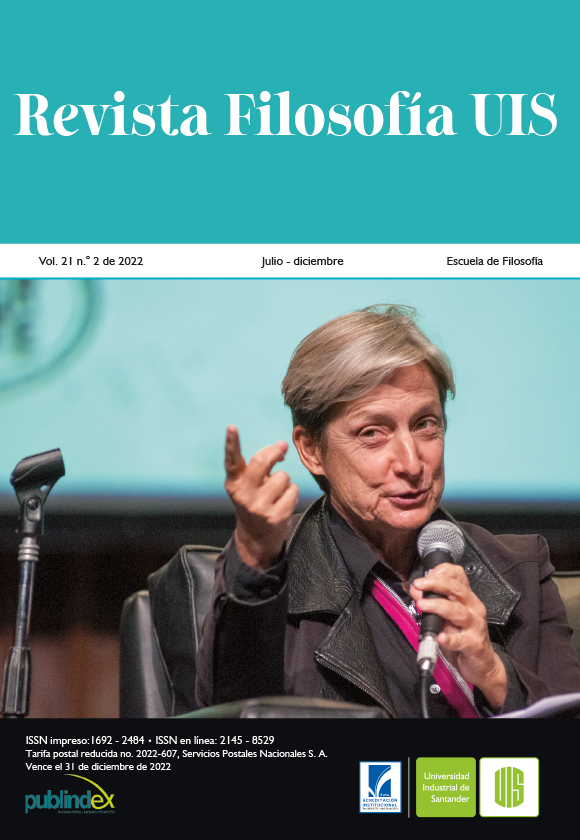Published 2022-07-01
Keywords
- Nature,
- subject of rights,
- subaltern,
- native Science,
- Other
- speak ...More
How to Cite
Copyright (c) 2022 Revista Filosofía UIS

This work is licensed under a Creative Commons Attribution 4.0 International License.
Abstract
The problem of substantive Subjectivation in Gayatri Chakravorty Spivak, the return to native science of Gregory Cajete as Other science, and the adjective subjectivation of Nature subject to rights in Caroline McDonough are the aspects that the present work thematizes; authors and whose contributions, apparently unrelated, keep a certain parallelism and complementarity for the dissertation about the protection of nature, which not only can speak, but also requires studies and affirmative actions so that it can indeed do so. It is an interdisciplinary three-voice philosophical dialogue about the Subject and the new Others (nature and native science) with respect to the Subject of the West. This, under the assumption that in the study of the protection of nature as a subject of rights, the reconstruction, resignification and relationship of the concepts of Subject, Science and Other, in application, is important and enriching. The above, with respect to the study and critical reflective foundation of conflicts in socio-natural relationships. Nature as a subject of rights is a new Other and is in a state of subalternization with respect to the hegemonic powers and knowledge of the West. In the same way, native science is another Other with which the discussion about nature is established and dialogued.
Downloads
References
- Acosta, A. (2019). Construcción constituyente de los derechos de la Naturaleza. Repasando una historia con mucho futuro. En L. Estupiñán Achury, C. Storini, R. Martínez Dalmau y F. de Carvalho Dantas (Eds.) La naturaleza como sujeto de derechos en el constitucionalismo democrático (pp. 155-206). Universidad Libre. https://bit.ly/2VOT4MK
- Ávila, R. (2019). Los derechos humanos y los derechos de la Naturaleza en el neoconstitucionalismo andino. Hacia un necesario y urgente cambio de paradigma. En L. Estupiñán Achury, C. Storini, R. Martínez Dalmau y F. de Carvalho Dantas (Eds.) La naturaleza como sujeto de derechos en el constitucionalismo democrático (pp. 109-134). Universidad Libre. https://bit.ly/2VOT4MK
- Ayala Osorio, G. (2020). Comunicación y estética-ética: el caso del monocultivo de la caña de azúcar. Revista Filosofía UIS, 19(1), 263-284. https://doi.org/10.18273/revfil.v19n1-2020004
- Benavides Ordóñez, J. y López Hidalgo, S. (2021). Consulta previa indígena y justicia constitucional: el caso Waorani. En J. Tole Martínez (Ed.), Voces de la Amazonía. Tomo I. El presente y el futuro de los derechos humanos y de los derechos de la naturaleza (pp. 391-429). Universidad Externado de Colombia.
- Cajete, G. (2018). Native Science and Sustaining Indigenous Communities. En M. K. Nelson & D. Shilling, (Eds.), Traditional Ecological Knowledge. Learning from Indigenous Practices for Environmental Sustainability (pp. 15-26). Cambridge University Press. https://doi.org/10.1017/9781108552998
- Chavarría, M. y García, F. (2004). Otra globalización es posible. Diálogo con Boaventura de Sousa Santos. Íconos, Revista de Ciencias Sociales, 19(2), 100-110. https://doi.org/10.17141/iconos.19.2004.42
- Corte Constitucional de Colombia (10 de noviembre de 2016). Sentencia T-622 de 2016. [Magistrado Ponente, Palacio, J.] https://www.corteconstitucional.gov.co/relatoria/2016/t-622-16.htm
- Foucault, M. (2012). Un diálogo sobre el poder. Gilles Deleuze/Michel Foucault. En M. Foucault, Un diálogo sobre el poder y otras conversaciones. (M. Morey, trad.) (pp. 29-43). Alianza Editorial.
- Galarza, C., y Storini C., (2019). Prólogo. Buen vivir, una nueva forma de ser, hacer y pensar. En L. Estupiñán Achury, C. Storini, R. Martínez Dalmau y F. de Carvalho Dantas (Eds.) La naturaleza como sujeto de derechos en el constitucionalismo democrático (pp. 13-16). Universidad Libre. https://bit.ly/2VOT4MK
- Guamán, A., y Aparicio, M. (2019). Los derechos de la naturaleza y la lucha frente al poder corporativo en Ecuador. El caso Texaco-Chevron, los alcances del ecoconstitucionalismo y las deficiencias de los mecanismos de garantía y reparación. En L. Estupiñán Achury, C. Storini, R. Martínez Dalmau y F. de Carvalho Dantas (Eds.) La naturaleza como sujeto de derechos en el constitucionalismo democrático (pp. 227-268). Universidad Libre. https://bit.ly/2VOT4MK
- Maldonado Serrano, J. F. (2020). Editorial. La filosofía frente a la tecnología computacional digital o la invención de la digitalidad. Revista Filosofía UIS, 19(1), https://doi.org/10.18273/revfil.v19n1-2020014
- McDonough, C. (2020). Will the River Get a Chance To Speak? Standing Up For the Legal Rights of Nature. Environmental Law Commmons, 31(1), 143-164. https://digitalcommons.law.villanova.edu/elj/vol31/iss1/4
- Spivak, G. C. (2003). ¿Puede hablar el subalterno? Revista Colombiana De Antropología, 39, 297–364. https://doi.org/10.22380/2539472X.1244
- UIS (2 de julio de 2021). La Constitución del 91 y la educación propia de las comunidades indígenas: aprendizajes y retos [Archivo de video]. YouTube, https://youtu.be/IzWiDzDxq3U
- Uchile Indígena [Universidad de Chile] (22 de noviembre de 2016). Entrevista a Gayatri Chakravorty Spivak. Facebook. https://m.facebook.com/UChileIndigena/videos/exclusiva-entrevista-a-gayatri-chakravorty-spivak/1823508901266298/

